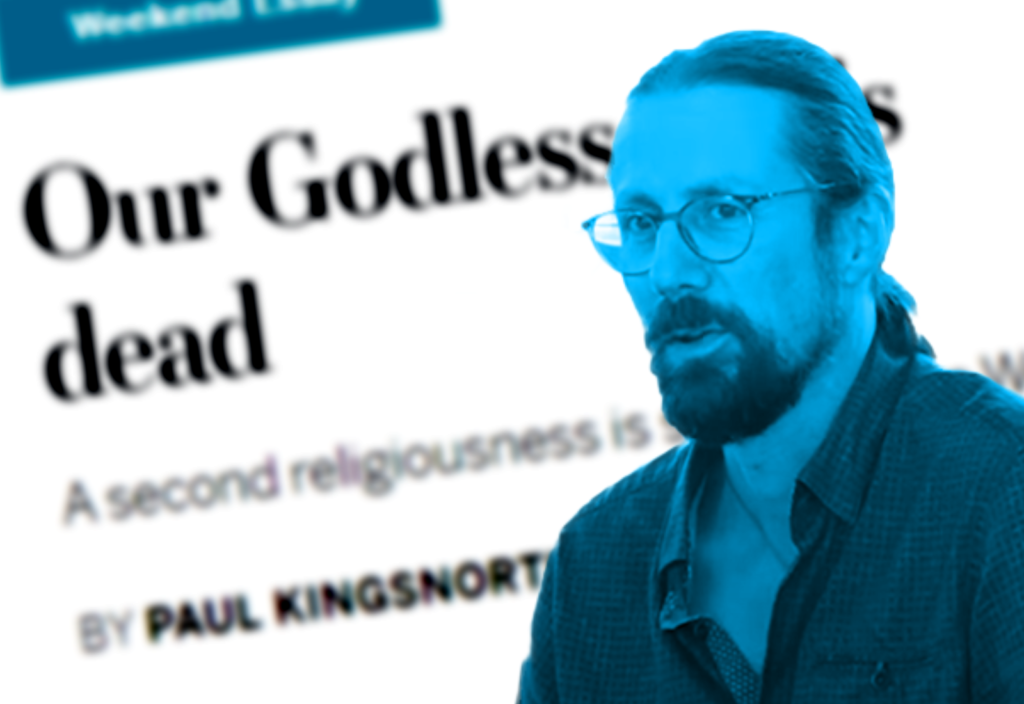‘Sin’ is a word embedded in our language and culture. It has wide use. Uprooting it would be as difficult as uprooting ‘sunrise’ or ‘sunset’, ‘heaven’ or ‘hell’, none of which describes a reality either. Yet we do well to tend the garden of language where we can. ‘Sin’ is a good plant to prune.
The Concise Oxford Dictionary defines ‘sin’ as an act of transgression against divine law or the principles of morality. Think of the ‘seven deadly sins’: pride, covetousness, lust, anger, gluttony, envy, sloth. But let’s differentiate between ‘divine law’ and ‘the principles of morality’.
‘Divine law’ is rooted in the idea of ‘creation and the fall’. It is deeply problematic in moral and anthropological terms. What about ‘principles of morality’ based on something other than ‘divine law’ – natural law or ethical reasoning? In that context, ‘sin’ loses almost all its meaning.
The word, after all, does not mean error or infraction, it means offence before ‘God’ and is traceable to the supposed ‘original sin’ of our imaginary ‘first parents’. It is an offence not against common decency or social acceptability, but against the dictates of a deity, as interpreted by the proponents of religions that date back two or three thousand years – the Biblical religions. ‘Sin’ lands folk in ‘hell’.
Lest there be any misunderstanding here, the official and contemporary Catholic catechism spells it out. In Part One, Paragraph 7 ‘The Fall’, this document states: “Only the light of divine Revelation clarifies the reality of sin and particularly of the sin committed at mankind’s origins. Without the knowledge Revelation gives of God we cannot recognize sin clearly and are tempted to explain it merely as a developmental flaw, a psychological weakness, a mistake, or the necessary consequence of an inadequate social structure …” etc.
Suppose, then, that we were to accept that there are developmental flaws in human beings and psychological weaknesses of various kinds in many of us, that we are all prone to make mistakes and that our social structures are very often egregiously inadequate. What would be left over that would require the designation ‘sin’?
The answer is only religious ‘Revelation’. The Catholic catechism goes on to state, under the heading ‘Original Sin – an essential truth of the faith’: “Although to some extent the People of God in the Old Testament had tried to understand the pathos of the human condition in the light of the history of the fall narrated in Genesis, they could not grasp this story’s ultimate meaning, which is revealed only in the light of the death and Resurrection of Jesus Christ. We must know Christ as the source of grace in order to know Adam as the source of sin… The Church, which has the mind of Christ, knows very well that we cannot tamper with the revelation of original sin without undermining the mystery of Christ.”
There you have it. Do away with ‘original sin’ and ‘Adam as the source of sin’ and you pull the rug from beneath the whole edifice of revelation and salvation. It’s just that simple. And we now know that there never was a ‘fall’, there never was an ‘Adam’, there never was any ‘original sin’. We now know that the hominin lineage can be traced back through millions of years of primate evolution and that, for all our flaws and inadequate social structures, we are – decidedly – a risen species, not a ‘fallen’ one.
Do away with ‘original sin’ and ‘Adam as the source of sin’ and you pull the rug from beneath the whole edifice of revelation and salvation.
Since the word ‘sin’ is based on untenable foundations, it is as misleading as turns of phrase based on confuted cosmology or geology, like sunrise and sunset. It should, therefore, with all its baggage, be pruned from serious usage. Resistance to taking this step is rooted in the long traditions of Biblical religion, more than it is in the vernacular or casual use of the term.
The locus classicus for interpretation of the narrative in Genesis as the ‘revelation’ of the ‘fall’ of humanity, in the persons of Adam and Eve, is Book XIII of St Augustine’s immensely influential and massy treatise The City of God. The fatal flaw in the theological argument is thrown into high relief by his baseless assertion that it was only because of the ‘sin’ of ‘Adam’ that death came into the world. This is unambiguously false. What does Augustine assert regarding sin and death? Here are his very words: “The first human beings…would not have experienced any kind of death if they had not sinned; and yet those first sinners were sentenced to death, with the provision that whatever sprang from their stock should incur the same punishment…because of the magnitude of that offense, the condemnation changed human nature for the worse; so that what first happened as a matter of punishment in the case of the first human beings, continued in their posterity as something natural and congenital.”
This doctrine is embedded in Christianity as a belief system. Luther and Calvin so embraced it that the former declared, in his Commentaries on Genesis, that had it not been for the ‘fall’ we would not have had to reproduce in the ‘disgusting’ manner that we do, with excretory and sexual organs in such revolting proximity – and shit would not stink. Thus Martin Luther.
This teaching about ‘sin’ and ‘fall’ has all manner of pernicious consequences. But the first and most important thing to register is that it is utterly without credibility. It won’t do to pass it off as some kind of vague allegory of the troubled or imperfect condition of the species. Quite simply, there was no fall and the claim that we congenitally inherit a ‘fallen’ and ‘sinful’ nature is an odious doctrine which in no way contributes to the development of enlightened or compassionate ethics. We must reject it, root and branch.
Among the pernicious consequences of the doctrine has been the obsession of the Christian churches with sexual transgression, ‘temptation’ and pleasure. Let it be said that it is certainly not a failure only of Christianity – to be sexually neurotic and repressive. But its doctrines and practices have been severe throughout its history. Disingenuous apologetics, in our time, cannot either airbrush this out of the record, or set out clear and well-founded guidelines for sexual morality now.
As John Cornwell, himself a lifetime Catholic and a sometime Catholic priest, confesses in The Dark Box: A Secret History of Confession (2014): “(Mortal sins, according to orthodox doctrine, include not only the major sins, such as murder, grand larceny, physical violence and adultery, but also all sexual sins: using condoms, having sex outside of marriage, having homosexual sex, divorcing and remarrying without an annulment, masturbation and indulging in ‘impure thoughts’.)”
When, in the early 20th century, he points out, confession became obligatory not only for adults but for children from the age of seven, two further abuses were introduced: the poisoning of young minds with guilt over natural inclinations and the exposure of generations of children to sexual abuse by all too many priests (themselves malformed by the same moral teachings) in the secrecy of confessional booths or other secluded places.
Quite simply, there was no fall and the claim that we congenitally inherit a ‘fallen’ and ‘sinful’ nature is an odious doctrine which in no way contributes to the development of enlightened or compassionate ethics. We must reject it, root and branch.
Suppose that, instead of Christian moral teaching of ‘original sin’ and inculcation of guilt and anxiety over all manner of sexual practices, we were to teach our young, and share as adults, something far closer to Aristotle’s Eudemian Ethics. It was written more than 300 years before the ‘saviour’ came to ‘redeem’ us all from ‘Adam’s sin’. How would that alter our states of mind and our practices?
The eight concise and accessible books of the Eudemian Ethics are titled as follows: Happiness the Chief Good; Virtue, Freedom and Responsibility; The Moral Virtues; Justice; Intellectual Virtue; Continence and Incontinence: Pleasure; Friendship; Virtue, Knowledge, Nobility and Happiness. Suppose these were made required reading and material for discussion in our secondary schools and simpler materials inspired by them taught in our elementary schools. ‘Sin’ would have no place in such a curriculum – and we would all be better off for that.
Aristotle’s thinking would, of course, be supplemented by and critiqued in the light of materials based on the findings of the human and natural sciences as these have come to light. But instead of ‘Revelation’ we would be building a transparent ethical foundation based on rational reflection and empirical evidence, moderation and human good, not guilt, fear and superstition.
Anthony Kenny, now 90, is a Catholic analytic philosopher and has written several books on Aristotle’s ethics, of which he is not uncritical. Kenny himself professes agnosticism, but goes to Mass and prays to ‘God’. He is a sophisticated thinker and mordantly quipped of the work of Richard Dawkins, “moving from The Extended Phenotype to The God Delusion is like moving from The Financial Times to The Sun.”
He has a point. Dawkins is very impatient with religious belief and writes indelicately on the subject. But moving from the doctrine of ‘original sin’ to the ethical reflections of Aristotle is like moving from a dark slum to an enlightened and prosperous polis. We should collectively and deliberately make that move and encourage others to do the same.
When we upgrade Aristotle on the basis of inquiry and critical reflection, we enlarge our individual minds and enlarge that polis into an enlightened version of the huge and cosmopolitan societies of the 21st century. There is scope in such development for endless learning, civilised discourse and cultivation of human flourishing – and for undoing the depravation of human moral consciousness embedded in the concept ‘sin’.
This article was originally published in the June 2021 edition (vol. 121) of Australian Rationalist under the title ‘Transgressions and virtues: A reflection on the idea of sin’.
Photo by Priscilla Du Preez on Unsplash














